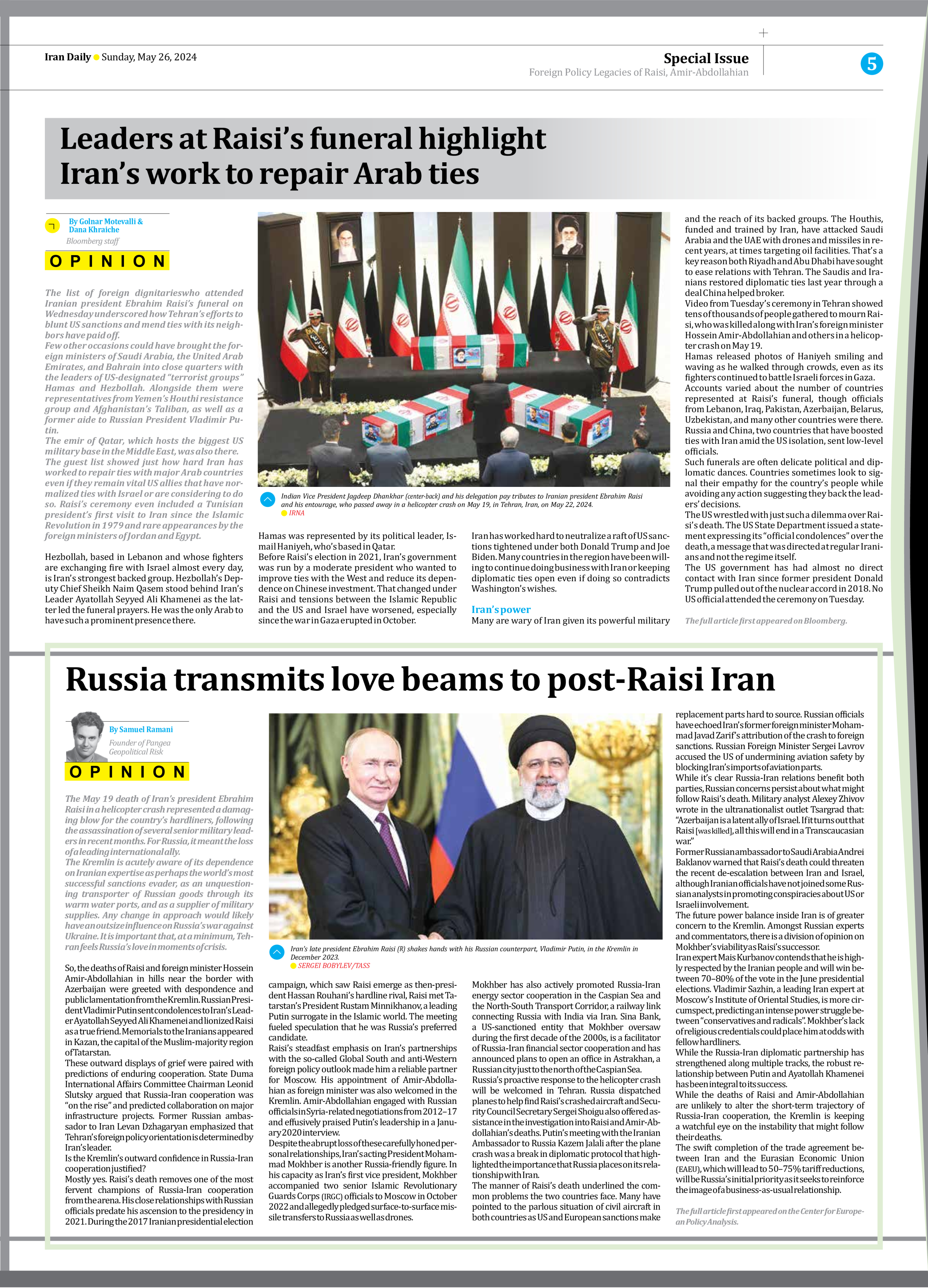
Russia transmits love beams to post-Raisi Iran
By Samuel Ramani
Founder of Pangea Geopolitical Risk
The May 19 death of Iran’s president Ebrahim Raisi in a helicopter crash represented a damaging blow for the country’s hardliners, following the assassination of several senior military leaders in recent months. For Russia, it meant the loss of a leading international ally.
The Kremlin is acutely aware of its dependence on Iranian expertise as perhaps the world’s most successful sanctions evader, as an unquestioning transporter of Russian goods through its warm water ports, and as a supplier of military supplies. Any change in approach would likely have an outsize influence on Russia’s war against Ukraine. It is important that, at a minimum, Tehran feels Russia’s love in moments of crisis.
So, the deaths of Raisi and foreign minister Hossein Amir-Abdollahian in hills near the border with Azerbaijan were greeted with despondence and public lamentation from the Kremlin. Russian President Vladimir Putin sent condolences to Iran’s Leader Ayatollah Seyyed Ali Khamenei and lionized Raisi as a true friend. Memorials to the Iranians appeared in Kazan, the capital of the Muslim-majority region of Tatarstan.
These outward displays of grief were paired with predictions of enduring cooperation. State Duma International Affairs Committee Chairman Leonid Slutsky argued that Russia-Iran cooperation was “on the rise” and predicted collaboration on major infrastructure projects. Former Russian ambassador to Iran Levan Dzhagaryan emphasized that Tehran’s foreign policy orientation is determined by Iran’s leader.
Is the Kremlin’s outward confidence in Russia-Iran cooperation justified?
Mostly yes. Raisi’s death removes one of the most fervent champions of Russia-Iran cooperation from the arena. His close relationships with Russian officials predate his ascension to the presidency in 2021. During the 2017 Iranian presidential election campaign, which saw Raisi emerge as then-president Hassan Rouhani’s hardline rival, Raisi met Tatarstan’s President Rustam Minnikhanov, a leading Putin surrogate in the Islamic world. The meeting fueled speculation that he was Russia’s preferred candidate.
Raisi’s steadfast emphasis on Iran’s partnerships with the so-called Global South and anti-Western foreign policy outlook made him a reliable partner for Moscow. His appointment of Amir-Abdollahian as foreign minister was also welcomed in the Kremlin. Amir-Abdollahian engaged with Russian officials in Syria-related negotiations from 2012–17 and effusively praised Putin’s leadership in a January 2020 interview.
Despite the abrupt loss of these carefully honed personal relationships, Iran’s acting President Mohammad Mokhber is another Russia-friendly figure. In his capacity as Iran’s first vice president, Mokhber accompanied two senior Islamic Revolutionary Guards Corps (IRGC) officials to Moscow in October 2022 and allegedly pledged surface-to-surface missile transfers to Russia as well as drones.
Mokhber has also actively promoted Russia-Iran energy sector cooperation in the Caspian Sea and the North-South Transport Corridor, a railway link connecting Russia with India via Iran. Sina Bank, a US-sanctioned entity that Mokhber oversaw during the first decade of the 2000s, is a facilitator of Russia-Iran financial sector cooperation and has announced plans to open an office in Astrakhan, a Russian city just to the north of the Caspian Sea.
Russia’s proactive response to the helicopter crash will be welcomed in Tehran. Russia dispatched planes to help find Raisi’s crashed aircraft and Security Council Secretary Sergei Shoigu also offered assistance in the investigation into Raisi and Amir-Abdollahian’s deaths. Putin’s meeting with the Iranian Ambassador to Russia Kazem Jalali after the plane crash was a break in diplomatic protocol that highlighted the importance that Russia places on its relationship with Iran.
The manner of Raisi’s death underlined the common problems the two countries face. Many have pointed to the parlous situation of civil aircraft in both countries as US and European sanctions make replacement parts hard to source. Russian officials have echoed Iran’s former foreign minister Mohammad Javad Zarif’s attribution of the crash to foreign sanctions. Russian Foreign Minister Sergei Lavrov accused the US of undermining aviation safety by blocking Iran’s imports of aviation parts.
While it’s clear Russia-Iran relations benefit both parties, Russian concerns persist about what might follow Raisi’s death. Military analyst Alexey Zhivov wrote in the ultranationalist outlet Tsargrad that: “Azerbaijan is a latent ally of Israel. If it turns out that Raisi [was killed], all this will end in a Transcaucasian war.”
Former Russian ambassador to Saudi Arabia Andrei Baklanov warned that Raisi’s death could threaten the recent de-escalation between Iran and Israel, although Iranian officials have not joined some Russian analysts in promoting conspiracies about US or Israeli involvement.
The future power balance inside Iran is of greater concern to the Kremlin. Amongst Russian experts and commentators, there is a division of opinion on Mokhber’s viability as Raisi’s successor.
Iran expert Mais Kurbanov contends that he is highly respected by the Iranian people and will win between 70–80% of the vote in the June presidential elections. Vladimir Sazhin, a leading Iran expert at Moscow’s Institute of Oriental Studies, is more circumspect, predicting an intense power struggle between “conservatives and radicals”. Mokhber’s lack of religious credentials could place him at odds with fellow hardliners.
While the Russia-Iran diplomatic partnership has strengthened along multiple tracks, the robust relationship between Putin and Ayatollah Khamenei has been integral to its success.
While the deaths of Raisi and Amir-Abdollahian are unlikely to alter the short-term trajectory of Russia-Iran cooperation, the Kremlin is keeping a watchful eye on the instability that might follow their deaths.
The swift completion of the trade agreement between Iran and the Eurasian Economic Union (EAEU), which will lead to 50–75% tariff reductions, will be Russia’s initial priority as it seeks to reinforce the image of a business-as-usual relationship.
The full article first appeared on the Center for European Policy Analysis.







